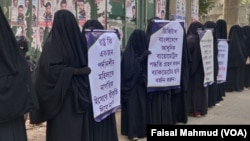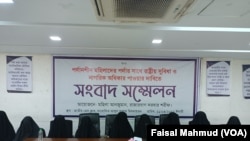About 150 women, all clad in full black burqas and niqabs – veils – held a press conference at Dhaka’s National Press club last month demanding the end of the requirement for photos in Bangladesh’s national identification card system.
The March 21 event was organized by Mahila Anjuman, a Muslim women’s organization. Advocates of the change see the requirement as a civil rights issue and an obstacle to obtaining public benefits.
They demanded that the photos be replaced by the use of biometric information, such as fingerprints, on the grounds that under Islam, women should not show their faces in public. They say their commitment to this religious principle is preventing them from obtaining identification cards.
According to Mahila Anjuman, tens of thousands of women are being denied the cards because they refuse to submit to photos. Officials at Bangladesh’s Election Commission said they do not have data on how many such women there are.
Religious Affairs Ministry Secretary Kazi Enamul Hasan told VOA that the government has every intention of making sure that all the country’s citizens get their identification cards.
“This is a very sensitive issue, as Bangladesh is a Muslim-majority nation and a huge part of our population is very pious and practicing. We will see how this issue can be resolved,” he said.
Two days after the press conference, a group of female students at Cumilla University, a public school, formed a human chain at their campus, demanding an end to the photo requirement for university admissions tests and saying they wanted biometric information to be used for student identification cards.
Bangladesh’s High Court issued a preliminary ruling at the beginning of March asking why the ID cards cannot be issued using biometric data in a case brought by Sumaiya Ahmed Muna, whose application for her national identification card without photos was denied. The respondents, who include various government officials, have not replied.
The incidents have sparked a heated debate in the country’s social media between those claiming veiled women have the democratic and civil right to get national ID cards without providing photos and those saying the rules cannot be bent for one group, pointing to security and other issues.
Logic behind the demand
Mahila Anjuman spokesperson Sharmin Yeasmin, whose organization is sponsored by Rajarbagh Darbar Sharif, a conservative Islamic organization that practices Sufism, told VOA that they wanted the removal of the photos because they strictly follow Islam.
Referring to different verses of the Quran, she said Islam does not recommend that women show their faces in public.
“There are hundreds of thousands of women in Bangladesh who wear full niqab and don’t show their faces in public. So they don’t take photos. As they don’t take photos, they can’t have their NIDs,” she said.
Yeasmin said biometric verification methods such as fingerprints are enough to identify someone.
“This sort of identification is not expensive now and is being widely used, along with photo identification. So we are demanding that it be the only method used,” she said.
When asked whether veiled women like her must take photos for passports to make the hajj, Yeasmin said most of the Bangladeshi veiled women involved here are not wealthy enough to make the hajj and it is not their immediate concern.
“You have to understand that our immediate concern is to get NIDs, not passports. Many of the women who wear niqabs can’t even draw their husband’s pension money as they don’t have NIDs,” she told VOA.
Muna, who filed the written petition with the High Court, told VOA she had tried to obtain an ID card through regular channels before initiating a legal proceeding.
“I tried to resolve it with the Election Commission, which issues the NID, but as they couldn’t do anything, I went to High Court,” she said.
Inconsistency and security issues
Some experts on Islamic rulings said some interpretations allow Muslim women to take photos.
Asif Shibgat Bhuiyan, a popular Bangladeshi blogger on Islamic jurisprudence, told VOA that he believes that the face itself does not need to be covered, so veils are not obligatory.
“However there are scholars who do deem it as mandatory. Obviously, those who are demanding the necessity of photo from NID are following the latter opinion and hence they won't look favorably at my opinion anyway,” he said.
“But if they do conform to taking photos for passports and deem it permissible for necessity then they should logically apply the same ruling for NID. Any demand needs to be logically consistent to be taken seriously; otherwise, it hurts the very cause for which the demands are being made at the first place,” Bhuiyan said.
Shahadat Hossain, a former election commissioner who was in charge of the government’s project to digitize national identification cards, said issuance of ID cards without photos would create security problems. “It is not possible to check biometric variables like fingerprints at all security checkpoints,” he said.
“When I was the project director of the NID project, we consulted with the Islamic preachers, as some of the women also raised the issue of photo identification at that time. Many of the preachers gave rulings that Islam allows women to take photos. I don’t know why this issue is resurfaced again,” he said.
Saimum Parvez, a fellow at Vrije University of Brussels, who has researched political Islam in Bangladesh, termed the women’s demand irrational, inconsistent with religious directives, and incompatible with Bangladesh’s current governance system.
“We should keep in mind that this issue is more political than religious. The Bangladeshi Muslims are, in general, very pious, and religion has been a significant factor in their lives. This irrational demand in public, and the support behind the demand, is a relatively new phenomenon,” he said.
“I think a combination of factors work simultaneously behind engendering this type of orthodoxy, including the present government’s Islamist appeasement policy, a sense of victimization among the Islamists, a pervasive social Islamization, and a lack of trust in the existing governance system,” Parvez said.
“The Awami League government,” he said, referring to Bangladesh’s current government, “which portrayed itself as secular, befriended conservative Islamists and appeased them to gain the political legitimacy of their authoritarian regime.”





